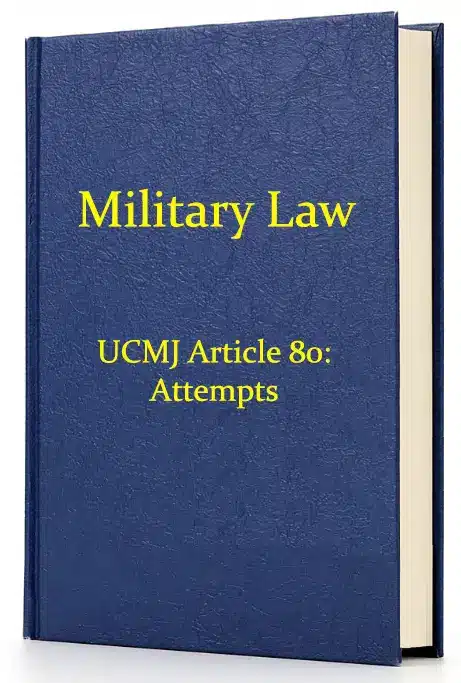A service member may be charged with a violation of Article 80 (Attempts) if they intentionally attempted to commit a crime that was executed unsuccessfully.
The MCM states the elements of the article include:
-
That the accused did a certain overt act;
-
the act was done with the specific intent to commit a certain offense under the UCMJ;
-
the act amounted to more than mere preparation; and
-
the act apparently tended to effect the commission of the intended offense
Understanding Article 80 (Attempts) of the UCMJ
To be prosecuted under Article 80, a service member must have had “a specific intent to commit the offense accompanied by an overt act which directly tends to accomplish the unlawful purpose.” The overt act included must go beyond the preparation phase and include direct acts necessary for the commission of the offense. Attempt may also be charged even if a factual impossibility is present. Article 80 may still be charged when a service member voluntarily abandons their intended crime depending upon the reasons for voluntary abandonment.
Maximum Possible Punishment under Article 80
Any service member convicted of violating Article 80 (Attempts) is subject to the same punishment as those who succeeded in the commission of the crime itself. However, those prosecuted under Article 80 are not subject to the death penalty, and confinement will not exceed 20 years except attempted murder.
How do you defend against Article 80 charges for Attempts under the UCMJ?
When facing the combined resources of the military and the current cultural climate, you need to be prepared to defend your career and your freedom. Crisp and Associates, LLC has a team of experienced trial attorneys who have won these cases. This team includes the firm’s founder, Jonathan Crisp, a highly respected former Army JAG with over 23 years of experience in military law and a sought-after speaker and lecturer on military law. Donald Gordon has litigated cases before the Discharge Review Board, the Board for Correction of Military Records, and the Board for Correction of Naval Records regarding a wide variety of matters and a diverse background of clients.
If you, or someone you know, is facing Article 77 as a principal of a crime, you need to speak with a Military defense attorney immediately.




